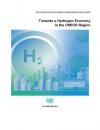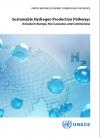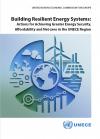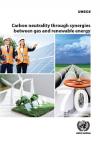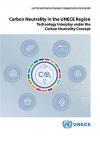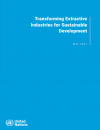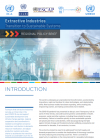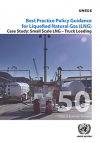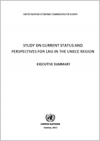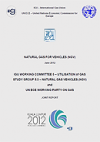Publications
Displaying Results 1 - 20 of 21
- English
Hydrogen is an energy carrier that can decarbonize economies and promote sustainable economic growth and system resilience. Although many low-emission hydrogen projects have been announced over the past two years, a mere 4% of them have reached a final investment decision. This indicates that achieving the scale and pace of hydrogen deployment requires more decisive actions from policymakers and
- English
ADVANCED VERSION
The transition of the global energy system is leading society towards an innovative future, offering an opportunity to transcend the current global economy in favour of a more sustainable one. Equal gender participation in this endeavour can help society leap to a future of technological advancement in the energy sector. This report analyzes key issues,
- English
Low-carbon hydrogen deployment is crucial for achieving the Paris Agreement goals and for deep decarbonization in hard-to-abate sectors (in particular, in heavy long-distance transport, in the steel industry, fertilizer production, etc.). By the end of 2022, more than 70 countries around the world are already involved in drafting of national hydrogen strategies or have already adopted them,
- Pусский
- Français
Dans la région de la CEE, les États membres sont confrontés à des défis sans précédent en raison de la pandémie de Covid-19, les crises géopolitiques, les perturbations dans la chaîne d’approvisionnement et les répercussions des changements climatiques. Ces défis ont mis à jour la vulnérabilité des systèmes énergétiques dans la région de la CEE et mis l’accent sur le besoin urgent de mettre en
- English
Across the UNECE region, member States are facing unprecedented challenges due to the COVID-19 pandemic, geopolitical crises in the region, supply chain disruptions, and climate change impacts. These challenges have exposed the vulnerability of the UNECE energy systems and highlighted the urgent need to build more resilient energy systems. The UNECE Expert Community prepared a paper to help
- Pусский
ADVANCED VERSION
Low-carbon hydrogen deployment is crucial for achieving the Paris Agreement goals and for deep decarbonization in hard-to-abate sectors (in particular, in heavy long-distance transport, in the steel industry, fertilizer production, etc.). By the end of 2022, more than 70 countries around the world are already involved in drafting of national hydrogen strategies
- English
The United Nations Economic Commission for Europe’s (ECE) Group of Experts on Gas teamed with the Group of Experts on Renewable Energy to identify and explore synergies between variable renewable energy (VRE) sources and natural gas. These synergies could provide the required affordably and flexibility needed to integrate an ever-increasing share of VRE in the energy mix. This publication
- Pусский
Эта публикация требует решительных и смелых действий со стороны правительства, частного сектора и регулирующих органов. Для разработки технологий потребуется новая нормативно-правовая база в поддержку немедленной коммерциализации. Политические рамки должны также включать в себя юридически связывающие обязательства в отношении расширения международной передачи технологий, согласованных стандартов
- English
This publication calls for ambitious and bold action from governments, the private sector and regulators. Development of technologies will require new regulatory frameworks to support immediate commercialization. Policy frameworks should also incorporate legally binding commitments for increased international technology transfer, harmonized standards, and definitions for 'green' hydrogen, energy
- English
Historically, extractive industries have also been a major driver of economic growth, particularly for now-advanced economies that benefitted during and after the Industrial Revolution. Currently, mineral resource extraction plays a dominant role in the economies of 81 countries that account for a quarter of global GDP, half of the world’s population and nearly 70 per cent of those living in
- English
The COVID-19 pandemic has presented an abrupt, even if temporary, halt to some of these trends, and underscored systemic vulnerabilities in health, economic, social and other systems, including those related to energy and industry. Failure to transition quickly to more sustainable systems will perpetuate these vulnerabilities, while also jeopardizing the fight against climate change and
- English
Removing Barriers to the Use of Natural Gas as Maritime Transportation FuelENERGY SERIES No. 54This report on Removing Barriers to the Use of Natural Gas as Maritime Transportation Fuel is another step in ourexploration of the catalytic role of natural gas in attaining the Sustainable Development Goals, and in
- English
Best Practice Policy Guidance for Liquefied Natural Gas (LNG)Case Study: Small Scale LNG – Truck LoadingENERGY SERIES No. 50The transportation of Liquefied Natural Gas (LNG) via truck loading is a fast growing vector of natural gas delivery and the main alternative to supply via pipelines. According to the
- English
- English
The Role of Gas in Sustainable Energy (Booklet - December 2015)Liquefied natural gas (LNG) – towards global gas marketsRecent market developments point to a fundamental change in the role of Liquefied Natural Gas (LNG) in the global energy landscape. The use of LNG to transport natural gas is poised to grow dramatically
- English
- English
NATURAL GAS FOR VEHICLES (NGV)June 2012IGU WORKING COMMITTEE 5 – UTILISATION of GASSTUDY GROUP 5.3 – NATURAL GAS VEHICLES (NGV)andUN ECE WORKING PARTY ON GASJOINT REPORT
- English
UNECE WPG STUDYUNECE Study on Underground Gas Storage in Europe and Central Asiain close cooperation with INTERNATIONAL GAS UNIONReviews the main trends in the underground gas storage in the UNECE regionContributes to increased visibility of future capacity and investment needsDiscusses regulatory, cost and operational
- English
UNECE WPG STUDYThe Impact of Liberalization of Natural Gas Markets in the UNECE region--Efficiency and Security 17 March 2012Liberalization of gas markets is at various stages throughout the 56-country UNECE region. Most countries that have liberalized have done so formally but rarely claim to have reached a satisfactory


